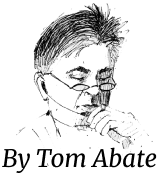In 1992 I parachuted into the newsroom of the San Francisco Examiner just as the post-Watergate hiring boom was coming to an end. The World Wide Web emerged while I was a reporter and columnist covering Silicon Valley. I had studied political science and knew enough economics to understand that any commodity became more valuable when it was scarce. This dynamic became an occupational hazard as new technologies to make and distribute information and entertainment began flooding the market. As news, analysis, and commentary began competing with new digital distractions like video games, human attention became a scarce commodity. Journalism and journalists began losing market power. The watchdogs of democracy were being marginalized by the realities of what has been called the Attention Economy.
At the same time, demographic, socioeconomic, and political phenomena coalesced to rob journalism of its superpowers – defining the public agenda and moderating civil discourse. In the 1920s political scientists had called this gatekeeper theory: media couldn’t tell people how to think, but media could tell them what to think about. This was still true as late as 1981 when television journalist Walter Cronkite closed his final CBS Evening News show with his tagline, “And that’s the way it is.” Even then, millions of Americans believed that a 30-minute telecast could encapsulate the vital affairs of a nation.
Traditional journalists must evolve new watchdog roles. Today they are obsessed with politics.
No more. Alternative news platforms arose to challenge the local newspapers and broadcasters that once enjoyed Cronkite-like authority in their cities or states. These organizations had become synonymous with the brand of journalism in which I was trained. But many consumers started getting their news from fair and balanced gatekeepers offering alternative public agendas. The century-old gatekeeper theory was being revised in real-time. Media could no longer tell all of the people, all of the time, what to think about. With multiple agendas, everyone could decide that other people were being fooled some of the time or most of the time
The convergence of these trends dumbfounded practitioners and consumers of journalism descended from Cronkite. Their process operates at a competitive disadvantage in the Attention Economy. It takes time to discover facts and test their truthfulness. But each piece of content has infinitesimal value. The faster it gets to market the sooner it can start gathering an audience of sufficient size to justify the effort of producing it. Accuracy counts for less than speed. That isn’t new. Long before the days of yellow journalism, it was said that a lie gets halfway around the world before the truth can pull its boots on. Social media simply accelerated the pace and lowered the bar. Why put on boots? Just run out naked and start screaming for attention.
To counteract the hysterical advantage of misinformation, disinformation, and conspiracy, traditional journalists must evolve new watchdog roles. Today they are obsessed with politics. They patrol national and state capitols, city halls, school boards, police departments, and a myriad of settings of potential political conflicts. These are not to ignored. They involve issues of taxation and public expenditures, public safety and personal rights, justice and hatred, and other problems beyond individual or private resolution. But political disagreements often arise from beliefs and values so deeply rooted in personal circumstances as to be unshakeable. In an era of declining trust, how much should we spend on the next political story when our stock in trade, the facts, are unlikely to change minds?
To be more effective watchdogs, journalists should start covering more phenomena outside the governmental, political, and cultural realms. Decisions that affect our lives are made every day by scientific, engineering, industrial, regulatory, public health, and a myriad of other quasi-public deliberative bodies.
We must devise ways to understand, simplify, and report back on their doings if we expect people to have any control over vast aspects of their lives. Now, these entities labor in obscurity until something like a pandemic breaks out. Suddenly, a field like public health goes from being ignored to misunderstood in a matter of days. Complex issues become politicized before journalists have time to create broad public awareness and acceptance of facts. Their barking lets you track the burglar going room-to-room. The more trustworthy and valuable watchdog would have let out a howl before the thief was in the house.


